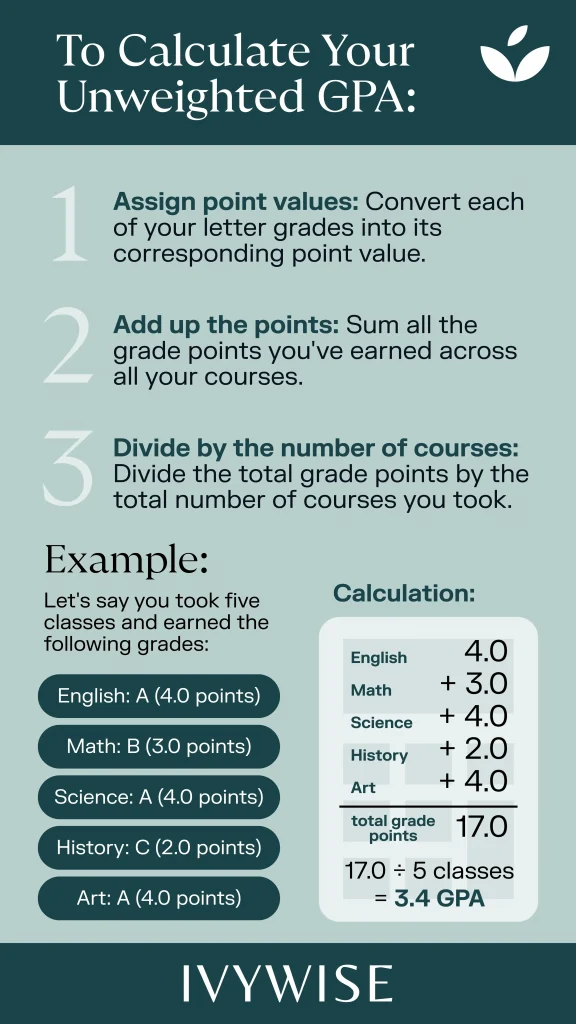Achieving a “good” GPA is a common goal for many high school students, but what does that really mean? How are GPAs calculated, and why is this number so important for college applications and future opportunities? We’ll explore the factors that contribute to a strong academic record to help you understand how to put your best foot forward.
Introduction to GPA: Its Calculation, Scores, and Importance
GPA, or grade point average, is essentially a numerical summary of your academic performance. It takes all your grades from your courses and averages them out, usually on a 4.0 scale (where an A typically equals 4.0). Think of it as a quick snapshot that shows how consistently you’ve performed in your classes.
Why does it matter? Your GPA is a major factor that colleges, universities, and even scholarship committees consider when evaluating applicants. A strong GPA demonstrates that you’re dedicated, capable of handling challenging coursework, and serious about your education, making you a more competitive candidate for future opportunities.
How Is GPA Calculated?
Learning how to calculate GPA involves assigning a numerical “point value” to each letter grade you receive and then averaging those points. The specific point values can vary between schools, but the 4.0 scale is common:
- A: 4.0
- B: 3.0
- C: 2.0
- D: 1.0
- F: 0.0

Keep in mind that your school’s specific grading scale and whether they use a weighted or unweighted GPA will affect your exact calculation. If you have any questions about your school’s grading system, talk to your school counselor.
Impact on Future Opportunities
Your GPA can significantly influence several key areas of your future:
- College admissions: This is perhaps the most direct impact. Colleges use your GPA to assess your academic preparedness and predict your success in higher education. A higher GPA generally increases your chances of acceptance to your desired schools — though it’s important to understand that you don’t need a perfect GPA to get into a good college.
- Scholarship opportunities: Many scholarships, both academic and merit-based, have GPA requirements. A strong GPA can open the door to valuable financial aid that can make college more affordable.
- Graduate school admissions: If you’re considering pursuing further education after your bachelor’s degree (like a master’s, law degree, or medical degree), your undergraduate GPA will be a critical factor in your admission to these programs.
- Early career prospects: While GPA becomes less relevant as you gain professional experience, it can be important for your first jobs or internships right out of high school or college. Employers, especially in competitive fields, may use the GPA as an initial screening tool to gauge your work ethic, discipline, and ability to learn.
- Academic honors and programs: A high GPA can qualify you for academic distinctions like the Dean’s List, honor societies, and specialized honors programs within your school or university, which can further enhance your resume and provide unique learning opportunities.
Understanding GPA Scales
A GPA scale is the system used to convert your letter grades into numerical values, which are then averaged to give you a single number representing your overall academic performance. Understanding whether your school uses an unweighted or weighted system (and how it works) helps you interpret your own academic standing and plan for your future.
Weighted vs Unweighted GPA
The unweighted, standard 4.0 scale is the most common and straightforward of GPA scales. Every letter grade is assigned a specific numerical value, as we showed above, and every class, regardless of its difficulty, is given the same weight. The unweighted GPA provides a simple, standardized measure that’s easy to understand and compare across different schools, at least initially. Some schools use a more detailed scale, including plus/minus grades (e.g., A- = 3.7, B+ = 3.3).
A weighted GPA scale considers the difficulty of the courses you take. This system is designed to reward students for challenging themselves with more advanced classes, such as Advanced Placement (AP), International Baccalaureate (IB), honors, and dual enrollment (college-level) courses. Because advanced classes are worth more points, it’s possible to achieve a GPA higher than a 4.0.
In a weighted system, these more challenging classes are assigned higher point values. For example, an A might be worth 5.0 points instead of 4.0. This can vary widely, since there is no standard scale for weighted GPAs.
The Role of GPA in College Admissions
Colleges are very sophisticated in how they evaluate GPAs during the admissions process. They understand that different high schools use different scaling systems (weighted, unweighted, or even completely different grading structures). Admissions officers will always look at your GPA in the context of your high school. They receive a school profile from your high school that explains its grading system, course offerings, and how GPA is calculated.
Many colleges will recalculate applicants’ GPAs to a standardized scale (often their own internal unweighted scale) to ensure fair comparisons between students from different high schools. However, even when they do this, they still note course rigor. A student with a 3.8 unweighted GPA who took many AP classes might be viewed more favorably than a student with a 4.0 unweighted GPA who took all regular classes.
The Importance of Maintaining a Good GPA
A good GPA is crucial for college acceptance because it’s often the primary indicator of your academic preparedness and potential for success in higher education. It provides a cumulative snapshot of your performance across all your high school courses, demonstrating your ability to consistently grasp new material, complete assignments, meet deadlines, and perform well over an extended period. Colleges see this as a strong predictor of how you’ll handle the academic demands of their programs.
Additionally, GPA is often an important screening tool at highly selective colleges to narrow down the applicant pool before the holistic review process takes place. But while it is one of the primary hard factors of your application, it’s also important to ensure you have strong standardized test scores, impactful extracurricular activities, compelling essays, strong recommendation letters, and more.
Average High School GPA at Selective Schools
Wondering what top schools in the U.S. consider a good GPA? This table lists the average high school GPA of all degree-seeking, first-time, first-year (freshman) students who submitted GPA — all class of 2028, unless otherwise indicated.
*Indicates class of 2027 — the most recent data available for that school.
Maximizing Your GPA: Tips and Strategies
Improving your GPA is a marathon, not a sprint, but with consistent effort and smart strategies, you can boost your academic performance. Additionally, you can improve some other skills that will serve you well in college and beyond. Follow these tips and strategies:
- Prioritize and set clear goals. Identify the subjects where you consistently struggle so you can focus your efforts. And set realistic and specific targets, such as raising your B in math to an A-.
- Learn effective study habits. Make a consistent effort to study regularly, emphasizing quality over quantity — a focused 30-minute study session without distractions is more effective than two hours of distracted studying. Take detailed notes, utilize practice tests, and engage with the material by summarizing it in your own words or creating flashcards.
- Stay engaged in your classes by maintaining consistent attendance, actively participating in discussions, and sitting up front.
- Master assignments by making sure you fully understand the instructions and expectations. Start early, proofread thoroughly before submitting, and review graded work to learn from your mistakes.
- Practice time management and organization by creating a study schedule, organizing your materials by subject, and limiting distractions. Avoid procrastination by starting assignments and projects well in advance and breaking them into smaller, manageable steps to make them seem less daunting.
- Ask for help from your teachers if you don’t understand something. You can also talk to them about what you can do to improve — they might offer specific advice or opportunities for extra credit.
- Seek additional academic support, such as tutoring, study groups, and libraries.
- Be strategic about your course selection. Taking advanced classes and doing well in them can significantly boost your GPA; however, it’s important to be realistic about how many challenging courses you can take and still maintain a good grade. Also consider taking electives where you feel you can earn a high grade. If you have a particularly low grade in a core subject, look for opportunities to retake the course and improve that specific grade.
GPA and Scholarship Opportunities
Maintaining a good GPA can help you maximize your financial aid options, though GPA requirements for scholarships can vary widely. Many of these scholarships set a specific minimum GPA as a basic eligibility requirement, but in general, the higher your GPA, the more competitive you will be. Additionally, you typically need to maintain or improve this GPA in college for multi-year or renewable scholarships.
Let’s look at the different types of scholarships and how much of a factor GPA is for each.
Merit-Based Scholarships
Unsurprisingly, your GPA plays a significant role in your eligibility for merit-based awards, since these scholarships are tied to academic performance. A high GPA is paramount, often alongside other academic factors like standardized test scores, course rigor, class rank, and academic awards. Examples include scholarships offered by national academic programs, private organizations or individuals, and colleges/universities for incoming first-year students.
Need-Based Scholarships
These are primarily based on financial need, determined by the FAFSA and other financial aid forms. While GPA isn’t the primary factor in being awarded these scholarships, Satisfactory Academic Progress (SAP) is a requirement to maintain eligibility. The SAP requirement can vary by school, but a GPA of 2.0 is common.
Talent/Skill-Based Scholarships
Students with specific talents, such as athletics, arts, music, and leadership, may be eligible for these scholarships if they meet the criteria. Your talent is the main focus, but a decent GPA is often still necessary to prove you can balance your talent with academics. For example, the NCAA requires student-athletes to maintain a minimum high school GPA in approved core courses to be eligible for athletic scholarships and college athletics: a 2.3 for Division I and 2.2 for Division II, respectively.
Community/Identity-Based Scholarships
These scholarships are for students from specific backgrounds, communities, or with unique characteristics. GPA requirements can vary greatly — some may have low or no GPA requirements, while others might still seek academically strong candidates within that group. For example, the American Indian College Fund requires applicants to have a minimum cumulative 2.0 GPA, but the Hyundai Women in STEM scholarship has no GPA requirement.
GPA’s Impact on Career Prospects
The importance of GPA for job seekers largely depends on a few key factors: your career stage, the industry you’re pursuing, and the specific company. When you have limited or no professional work experience, for example, employers may use your GPA to get a sense of your work ethic, discipline, intelligence, and ability to learn and succeed in a structured environment.
Once you’ve landed your first job and gained a few years of professional experience, your GPA rapidly diminishes in importance. Future employers will be far more interested in your work history, accomplishments, skills, professional references, and what you can do in a real-world setting.
Industries Where GPA Matters
GPA and career prospects tend to be tied together in highly competitive industries that require analytical or technical skills:
- Finance: Investment banks and financial institutions often use GPA to filter candidates for entry-level roles, particularly in analyst positions.
- Engineering and tech (especially for R&D or specialized roles): Strong GPAs can indicate a solid grasp of complex technical concepts.
- Accounting: A good GPA can be seen as an indicator of attention to detail and analytical skills.
- Research-oriented roles: Whether in academia or industry, a high GPA demonstrates strong research and analytical capabilities.
- Pharmaceuticals: High GPAs, along with a strong scientific background, are often required for research and development roles.
- Consulting: Firms use GPA as a screening tool and as an indicator of several valuable skills, such as analytical ability, work ethic and discipline, attention to detail, and the ability to learn quickly.
Larger companies, especially those that frequently recruit on college campuses, often have more structured hiring processes that may include GPA requirements.
Using GPA Calculators Effectively
GPA calculators can be powerful tools, transforming the abstract concept of a grade point average into a tangible and actionable metric for academic planning. However, it’s important to understand the best practices for using these tools to ensure you get the most out of them.
Academic Planning
You can use GPA calculators to aid in goal setting, course selection, identifying weak subject areas, planning for college, and more. Here are some ways to use these tools for academic planning:
- Setting goals: Input your current grades and experiment with hypothetical grades for future assignments or semesters. This can help you see what grades you need to achieve a specific target GPA, which can be a strong motivator. Additionally, using a GPA calculator can help you understand the impact of individual grades on your cumulative GPA.
- Selecting courses: Many GPA calculators allow for both weighted and unweighted calculations. You can see how taking a challenging course and earning a good grade (e.g., an A in an AP class, which might be worth 5.0 points) can boost your weighted GPA compared to a regular class. This helps you make informed decisions about balancing rigor with achievable grades. You can also assess how “easier” electives might affect your overall GPA, helping you balance challenging core subjects with courses where you feel confident of earning a high grade.
- Identifying areas for improvement: By inputting all your grades, you can clearly see which subjects or courses are pulling your GPA down. This allows you to allocate more study time and seek extra help in those specific areas.
- Preparing for college admissions: You can compare your current GPA to the average GPAs of admitted students at your target colleges. This provides a realistic benchmark and helps you understand how competitive you are academically, which can guide your balanced college list.
- Tracking scholarship/financial aid eligibility: Many scholarships and financial aid programs have specific GPA requirements. Using a GPA calculator helps you determine if you are on track to meet these criteria or what you need to do to qualify. This is especially important for merit-based scholarships.
Best Practices
Not all GPA calculators are the same. To get the most out of this tool, it’s important to choose the one that best fits your needs. Here are some of our GPA calculation tips:
- Use one that matches your school’s system. Does your school use an unweighted or weighted GPA system? What about plus/minus grades? How are credit hours assigned? Consider all these factors when choosing a calculator.
- Strive for accuracy. Input every grade you’ve received in every course that contributes to your official high school GPA — even lower grades — and only use grades that have been officially recorded by your school. Also, it’s important to be aware of how many total courses or credits you’ve taken, as this is the divisor in the GPA calculation.
- Be proactive and consistent to help you identify GPA trends over time.
- Use it before course registration deadlines to model the impact of different course selections.
- Experiment with different grades for upcoming assignments or semesters to see how they impact your overall GPA.
Improve Your GPA with IvyWise
Understanding your GPA empowers you to take control of your academic journey and make informed decisions about your future. However, it can sometimes be difficult to maintain or improve your GPA without expert guidance — especially as your coursework becomes more challenging. At IvyWise, we offer comprehensive college admissions counseling and tutoring programs that not only help you improve your GPA but also develop into a standout college applicant. Schedule a complimentary Discovery Call to learn more.
Contact Us





